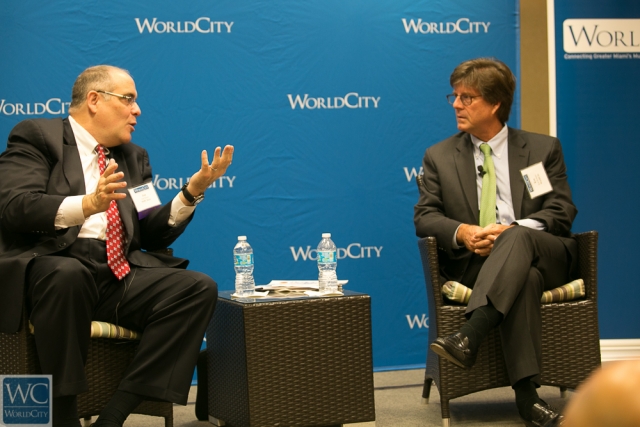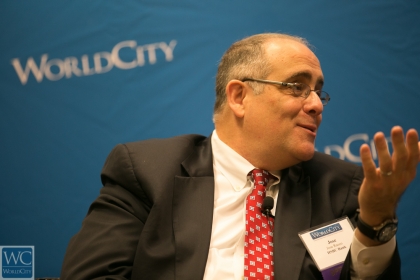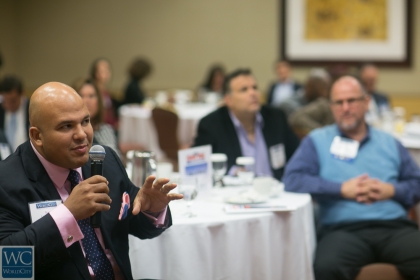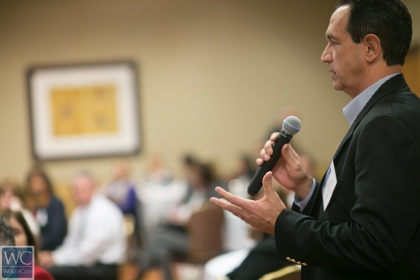After slow 2014, trade outlook brighter for 2015

South Florida’s trade with the world dipped in the first three quarters of 2014, but the outlook for 2015 is brighter.
Those were among forecasts from WorldCity’s Trade Connections held Dec. 10 and headlined by economist Jose A. Rasco, chief investment strategist at HSBC Private Bank Americas.
WorldCity President Ken Roberts said lower gold prices have been hitting hard at both imports and exports in South Florida. They contributed to a 9 percent drop through September in the value of trade at Miami International Airport (MIA), a hub for gold shipments and epicenter of South Florida trade.
Gold prices had soared when the metal became a financial hedge during recession, boosting trade values. But now, they’re settling and likely won’t skew Miami trade numbers for 2015, he said.
Instead, the improving U.S. economy should spur trade, said Roberts. That could mean imports and exports in the Key West to Fort Pierce area closer to the $120.5 billion level registered in 2013.
Oil prices and global demand to pick up in 2015
Worldwide, what could prove key for 2015 trade are declining prices for oil, said Rasco. The reasons for price declines matter: If prices fall on lower consumer demand, that could signal another recession. But if they’re down from oversupply, that might be temporary. Extra output can be sopped up later.

Jose A. Rasco, chief investment strategist at HSBC Private Bank Americas.Photos by Carlos Miller
Oil prices have been slipping lately from rising output. “We think demand will pick up modestly next year and prices too,” Rasco said, also forecasting moderate growth for the world economy in 2015.
What’s more, lower prices for oil and other commodities could spur consumers in the world’s two largest economies to spend more on other goods in 2015, boosting world trade, said Rasco.
“Give the U.S. consumer a dollar, and they’ll spend $1.25,” he joked. And the Chinese are big shoppers too: E-commerce giant Alibaba reported more than $9 billion in sales on China’s “Singles Day” Nov. 11.
Participants had loads of questions at the luncheon held in Doral.
What do you forecast for consumer demand in Europe and Latin America in 2015?, asked Mario Suarez, who develops international business for Export Americas Corp.
Europe’s demand will hardly grow, Rasco said. The European Union typically gets about 40 percent of revenues from exports, but domestic demand is so weak that exports now make up about half of revenue. Indeed, Europe wants to export more to lift its economy, especially food and luxury products.
Worldwide, prospects for luxury sales look good, but rising income inequality is pinching other markets. “The middle class in most developed markets is not doing well,” Rasco said. Yet the rising middle class in developing nations offers tremendous opportunities for all types of consumer goods and services.
Weak outlook for Brazil, better prospects for Mexico
How much consumer demand grows in emerging nations depends partly on the pace of their market reforms, said Rasco. Mexican consumers should get a big boost in 2015 from reforms in telecom and other industries, but Brazilians likely won’t gain much. Brazil is Florida’s top trade partner.
Worse yet, if sputtering Brazil raises taxes and faces problems paying its debt, “there’s potential for recession and loss of investment grade” in South America’s largest economy, Rasco warned.

Leo Alexander, Director of Business Development for McGladrey.
Is the shift in manufacturing from China to Mexico a trend, or is “near-shoring” just a reaction to higher labor rates and counterfeiting in China? asked Nick Wigoda, vice president for real estate giant JLL.
“Near-shoring is not a short-term fad. It’s here to stay,” said Rasco. Mexico’s labor rates now are lower than China’s, partly because of the continued rise in value of China’s remnibi currency, he said.
Do you see the United States investing in more infrastructure projects, now that Republicans are taking control of Congress?, asked Mario Alfonso , managing director at logistics firm Delmar International.

Mario Alfonso , managing director at logistics firm Delmar International.
“It’s tough enough to predict the economy, never mind Congress,” joked Rasco. With the state of the nation’s bridges and tunnels “woeful,” investment likely will come on state and local levels, he said.
Tech boom to revolutionize trade?
Longer-term, new technologies portend major changes for global trade, Rasco predicted.
“We are in the beginning of a tech boom in this country that is going to blow the ’90s and the internet away,” he said. He’s hot on such innovations as the the “Internet of Things” that lets machines talk to each other through sensors and on analytics from “Big Data” generated by computers.
The rise of 3D printing of goods could potentially disrupt supply chains, as more buyers print out what they want instead of buying products or components from others. “The low-wage, low-value countries are going to get hurt,” as more consumers print out customized jeans at home, for example, said Rasco.
Through September, the value of trade fell at both of Miami’s top ports from the same period a year earlier, Roberts said. Trade at Miami International Airport dropped nearly 9 percent to $46.7 billion, while trade at PortMiami slid nearly 5 percent to $17.6 billion, an analysis of U.S. Census data shows.
In contrast, the value of trade at Port Everglades in Fort Lauderdale increased by nearly 7 percent during the period, partly because of higher prices for petroleum products earlier in 2014. Port Everglades is the principal port for imports of gasoline and jet fuel for the South Florida area.
Trade Connections is one of six event series that WorldCity offered in 2015 to bring together execuives in greater Miami on international business topics. The Trade series is sponsored by PortMiami, Miami-Dade Aviation, HSBC and American Airlines Cargo.
The next Trade Connections is Feb. 20, while the May 1 meeting will launch WorldCity’s latest annual Miami TradeNumbers.